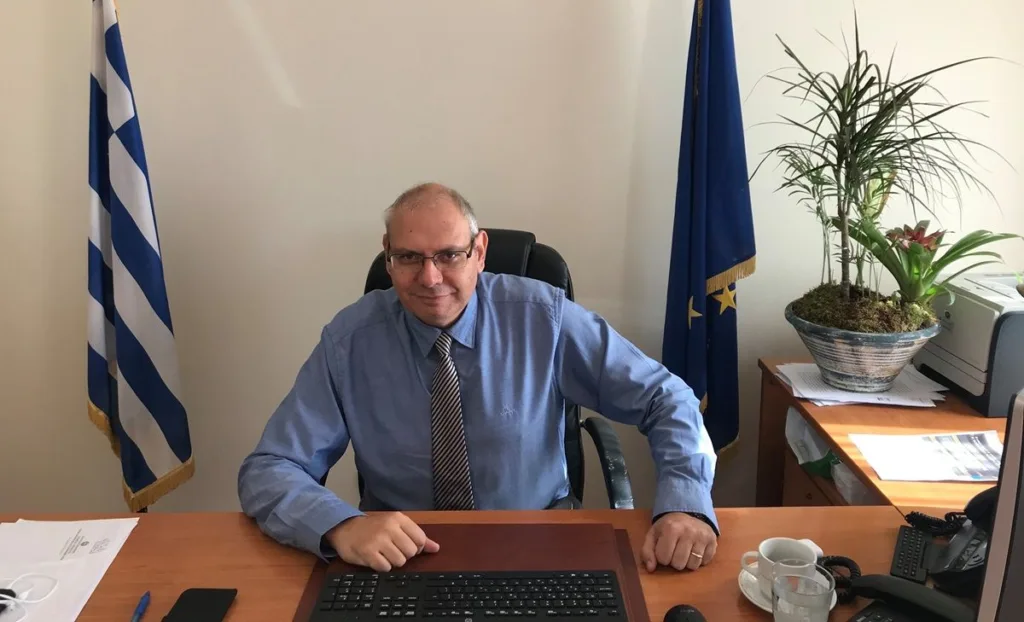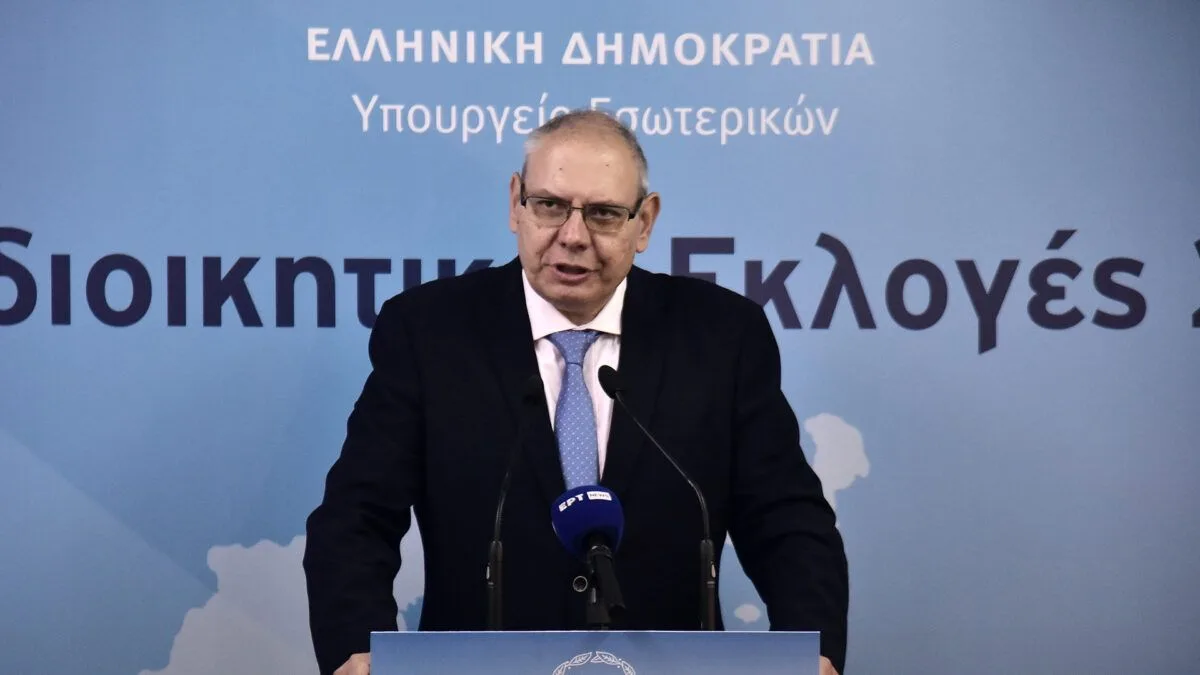By Ilias Karagiannis
Landing in Sydney on Monday, 6 October, Secretary General for Home Affairs and Organisation from the Greek Ministry of Interior, Athanasios Balermpas, begins a 12-day tour of Australia and New Zealand with a clear brief: listen to community needs and deliver practical fixes.
In a wide-ranging exclusive interview with The Greek Herald, he outlines upgrades to the Special Registry, new digital pathways for Greeks abroad, and plans to expand overseas voting — all with timelines, concrete steps, and a pledge to “provide solutions.”
Mr Balermpas, which Australian cities will you visit during your stay? What is the main goal of this visit, and what do you hope to gain from direct contact with the Greeks of Australia?
We will begin our official visit in Sydney and then go to New Zealand, to Auckland. After that, we will return to Australia — to Brisbane and Canberra — and the visit will conclude in Melbourne, from where we will depart back to Greece.
Greek citizens living abroad have a number of issues when it comes to their contact with the Greek state. The main ministry they interact with is the Ministry of the Interior.
I experienced this in the previous four-year term (2019–2023), when I served as Secretary General of Citizenship at the Ministry of the Interior.
Now I am Secretary General for Home Affairs and Organisation, and together with the current Secretary General of Citizenship, we are coming to examine important matters. Mr Karnavos will deal with issues concerning expatriates who do not yet have Greek citizenship and wish to acquire it.
As for me, I will be addressing issues faced by Greek citizens who need to declare life events — such as marriages, baptisms, births, and deaths.
Unfortunately, there is a mistaken perception that the Special Registry has closed. It has not closed — on the contrary, it functions perfectly well.
Since 2022, when consuls were given the ability to register directly in the Citizens’ Register, the Special Registry mainly handles requests from consulates for clarifications, as well as from expatriates who live over 500 kilometres away from the nearest consulate.
That is, if someone in Australia lives 500 kilometres away from the nearest consulate, they can authorise someone in Athens to register their marriage on their behalf.
We are planning many things for the reform of the Special Registry, in order to provide better services.
It is a state structure created many years ago under the assumption that only a few tens or hundreds of thousands of Greek citizens lived abroad, whereas now there are close to two million around the world.
These are citizens who marry, have children, enter civil partnerships, and so on — all of which must be declared to the Greek state so they can retain the benefits of Greek citizenship. For example, when someone has a child abroad, that child automatically becomes a Greek citizen upon registration of their birth.
So, I understand that you would be satisfied if we could dispel some misconceptions held by members of the diaspora regarding these matters?
I would like us to inform them more fully and accurately about what actually applies. I will also touch on other details. Many are children of Greek citizens whose parents never declared their existence to the Greek state — they decided not to register them as Greeks.
According to the law, they are Greeks, but they must be declared in order to officially acquire Greek citizenship. This falls under my remit — the so-called delayed registration of adults.
So, those who are 40, 45, or 50 years old and have a Greek father or mother — that is, a parent listed in the Citizens’ Register — simply declare their life events to the consul, and they are automatically entered in the municipal roll, become Greek citizens, and can obtain a passport. These are the things I wish to explain.

The Greek community in Australia often expresses concerns about delays and bureaucracy in registering civil acts. What initiatives are being taken by the Ministry and your Secretariat to accelerate procedures and reduce inconvenience for citizens? Is digitalisation the solution?
Deputy Minister Mr Loverdos, who is also responsible for public diplomacy, will speak about how consulates are to be transformed. The digital consulate is already at a very good stage, and there is also the KEP for expatriates (Citizen Service Centre).
In collaboration with the Ministry of Digital Governance, with which we work closely — since we hold the Reference Archive of the Greek State, where all Greek citizens, living and deceased, are recorded — we are trying to create alternative ways for Greeks abroad to enjoy digital access to state services, just as Greeks within Greece do.
For instance, if I want to make a solemn declaration and authorise a friend to transfer my car to a third party, I can enter Gov.gr within seconds, prepare the declaration, and send it electronically to those concerned. This may not be possible for a Greek abroad — either because they don’t have a Taxisnet account, as they’re not required to, or because they cannot receive the OTP code on their mobile phone.
We are exploring ways for Greeks abroad to access these digital services through alternative identification and data-processing methods.
The same applies to the Special Registry, which has entered a phase of full digitalisation.
Initially, this will apply to those in Greece — such as lawyers or authorised individuals — and we are already in contact with the Special Secretariat for Artificial Intelligence to find tools that will, in time, allow Greeks abroad to log into a platform, submit their documents, and have their registration processed automatically — without even visiting a consulate.
When you say “in time”, do you estimate this will happen before the end of this government’s term, in 2027?
We are already preparing the requirements for the preliminary studies. We expect to have them ready by February 2026. Once we have those, we will immediately proceed to tender documentation and competition.
Therefore, if all goes well, by the end of 2027 we will have ready the tools that will allow Greeks everywhere to have a new kind of relationship with the Greek state.
In the past five years, enormous strides have been made in digitalisation — we are now ahead of the United States and Germany. However, these services must also become accessible to Greeks outside Greece.
A second issue I wish to inform Greeks in Australia about is that the law has changed: there are now no prerequisites to be registered as a voter abroad. The platform is already open — anyone can register and declare, for example, “I am registered to vote in Kypseli, but I am currently in Brisbane and wish to vote there.”
Let’s move on to this issue. How does your Secretariat assess the electoral process for Greeks in Australia? And although an increased parliamentary majority is required, do you believe we will see postal voting in national elections for the diaspora?
Look, in the 2023 elections, the problem was that Greeks abroad had to prove certain things to be entered in the special register. There were system issues — certain documents couldn’t be uploaded to the platform, and many citizens faced difficulties.
Fortunately, the first law passed by the Mitsotakis government after the 2023 elections abolished all such restrictions. So now, all a Greek abroad needs is to be registered in the electoral roll of any municipality.
In the 2024 European elections, we tested postal voting — finally a milestone for Greek political life and society. About 55,000 Greeks abroad registered. From Australia, fewer than 100 voted in 2023, but by 2024, about 800–815 had registered. You may say that’s still few — fair enough — but, if I may add a political comment, the European elections don’t mean much to Greeks living outside the European Union.
To a Greek in America, Canada, South Africa, Australia, or New Zealand, voting for someone going to Brussels isn’t particularly relevant.
Eighty-five per cent of the 55,000 voters abroad came from European countries. National elections are different — they allow Greeks everywhere to have a say in how the country is governed.
The government is committed to introducing a bill for postal voting in national elections at some point. The issue is that national elections require a reinforced majority of 201 MPs. So, I don’t know whether postal voting for overseas voters will pass. That’s why we are also considering opening more polling stations abroad.
This trip to Australia is therefore important so I can meet with Ambassador Mr Venizelos and the consular authorities to get a first-hand picture of the requirements for establishing polling stations.
In 2023, a polling station could only be set up if there were at least 40 registered voters. I have proposed to the Minister that we legislate to lower that threshold to 30. If only 25 register in Brisbane, they will have to vote in the nearest station.
However, in cities with large Greek populations, we will try to open not one but two or three stations in different areas, to make voting easier.
That is the perspective behind this entire plan.
Hopefully, postal voting will pass; but if it doesn’t — something I sincerely hope won’t happen — we will strive to be as prepared and as open as possible to the diaspora’s proposals, so that we can set up the necessary polling stations and ensure Greeks in Australia can express their opinion through their vote.
I’d like to end with a message to the Greeks of Australia, who often feel neglected by the Greek state. Your visit is tangible proof that you are close to them — what message would you like to send?
I am eager — that’s the word… I am eager, impatient to come into contact with Hellenism in Australia — to listen, to become wiser, but also to return and offer solutions. I like offering solutions.
When I first went to America as Secretary General of Citizenship, people would tell me their problems and I would respond: “We’ll solve this one this way, and that one another way.”
That’s our job — to make Greek citizens feel better about their state.
You see, I come from the private sector. So, for the past six years at the Ministry of the Interior — the ministry of the state — I have been trying to convince public services to operate with a citizen-centred approach.
That means seeing the citizen first — the recipient of the service. You must look at what the citizen expects from you and then decide how to deliver it. Don’t focus on what you can give; focus on what they want you to give.
That’s what I want to find out in Australia — what they want us to give them. And then, we’ll look for the ways to provide it.
